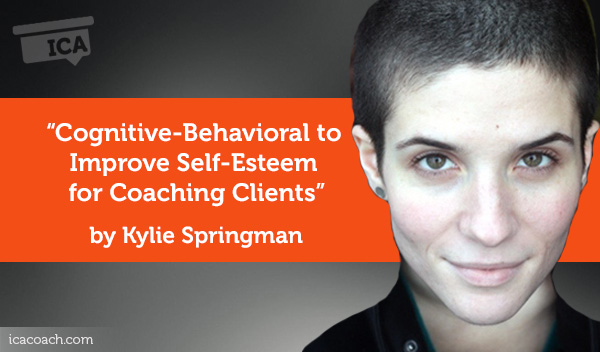
Research Paper By Kylie Springman
(Empowerment Coach, UNITED STATES)
This paper endeavors to answer the following question: In what ways can cognitive-behavioral tools be used to move life coaching clients toward improved self-esteem?
Despite the assumptions of some, who believe that self-esteem work belongs in the realm of therapy and mental health, coaching can be utilized as a way for clients to move proactively toward greater self-esteem. In this paper, cognitive-behavioral techniques will be utilized within a coaching context. Three main techniques are illustrated below: First, problematic perfectionistic beliefs and behaviors will be addressed. Second, the paper will address the importance of identifying and challenging critical self-talk. Lastly, the paper will emphasize the essential practices of achieving small goals and celebrating strengths.
What is Cognitive-Behavioral Therapy (CBT)?
According to Psychology Today,
Cognitive-behavioral therapy (CBT) is a form of psychotherapy that treats problems and boosts happiness by modifying dysfunctional emotions, behaviors, and thoughts. Unlike traditional Freudian psychoanalysis, which probes the wounds of childhood to get at the root causes of conflict, CBT focuses on solutions, encouraging patients to challenge distorted cognitions and change destructive patterns of behavior (“Cognitive Behavioral Therapy”).
CBT provides a range of tools that help clients to move forward toward their goals.
What Is Coaching?
Coaching is a partnership between a coach and a client wherein the coach provides exercises, accountability, active listening, and encouragement to help a client move toward his or her goals. Although the one-on-one format of coaching can be somewhat similar to therapy, there are key differences between the two. The most critical disparity is that “therapy tends to focus on feelings and experiences related to past events, whereas coaching is oriented towards goal setting and encourages the client to move forward. A therapist typically works with a dysfunctional person to get them to become functional. A coach works with a functional person to get them to become exceptional” (Coaching – What Is It? 3).
How Can Cognitive-Behavioral Therapy Be Utilized in Coaching?
Unlike many elements of therapy, CBT can be useful in a coaching relationship specifically because it directly addresses the workings of the brain and behavior in the present moment. CBT presents practical exercises that the client does (similar to the homework often assigned by a coach to a coaching client), and these exercises help to move the client toward a defined goal. CBT is especially useful in helping clients to improve their self-esteem since self-esteem is related to perfectionism (or its absence), self-talk, limiting beliefs, and achievement. These are all subjects that are regularly addressed in many coaching relationships.